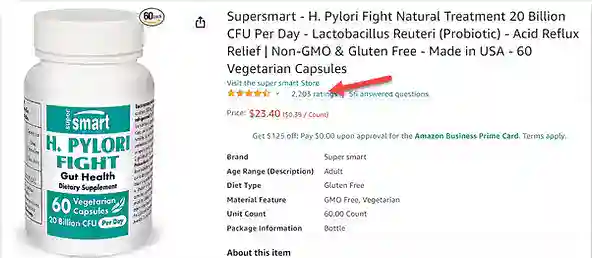H. Pylori is a bacteria that lives in your gut and can cause a lot of autoimmune diseases in your body, as well as a number of GI issues when it makes its way into your stomach.
Symptoms of an infection caused by H. Pylori can include:
- Decreased appetite
- Belching
- Bloating
- Increased gum bleeding
- Heartburn
- Feeling as if you have a full stomach
- Nausea
- Bad taste in your mouth
- Stomach pain
H. Pylori can be tested really easily through a stool sample. But what can cause H. Pylori infections?
Causes of H. Pylori Infections
Around 30-40% of all people living in the United States will have an infection of H. Pylori at some point in their life. Most of these people are infected as children.
There are a number of potential causes of an H. Pylori infection. They can include:
- Biofilm growth of H. Pylori
- Food sensitivity (including gluten, dairy, and eggs)
- Low vitamin D
- Concussions
- High inflammation
- Overactive, or high levels of A1c proteins
- High insulin or glucose levels
- Low white blood cell count
- Underlying autoimmune disease
- Poor fat absorption
- Poor GI system
- Mold
- Stress
- Poor sleep
Testing for H. Pylori
A stool sample is required to test for H. Pylori, which is usually done by receiving a kit in which you deposit your feces and mail it back.
The more extensive tests should cost around $98, and will identify multiple strains of H. Pylori. Less extensive tests will cost around $54. The process is much the same for both.
These tests can help identify what strains of H. Pylori are infecting you, and in what amounts. This in turn helps guide the treatment plan you and your doctor will create.
How Does H. Pylori Cause Problems?
Your stomach has a lining that protects the organ’s cells. H. Pylori bacteria burrow into this protective lining and inhibits the production of stomach acid. It accomplishes this by creating urease, which turns into ammonia and neutralizes stomach acid.
This neutralized stomach acid causes poor digestion, which in turn allows H. Pylori to flourish.
Stomach acid has a very low pH, around 1 or so. This low pH is required for your stomach acid to break down your food. If you don’t have enough acid, or if it is too high of a pH, it will not adequately break down your food.
If your food is left in the stomach without breaking down, it will begin to rot in your stomach. This can lead to leaky gut, leaky brain, gas, bloating, diarrhea, chronic inflammation, and many other problems.
The research is showing that having an H. Pylori infection is directly connected to a number of autoimmune diseases.
The autoimmune diseases most connected to H. Pylori include:
- Rheumatoid arthritis
- Lupus
- Type 1 diabetes
- Thrombocytopenia (clotting)
- Sjogren’s Syndrome
- Autoimmune thyroiditis
- Chronic urticaria
- Ulcerative colitis (Crohn’s disease)
- Psoriasis
H. Pylori affects all of these systems by inhibiting your stomach cells that secrete stomach acid. This throws off your digestive system, which in turn throws off a wide range of other organ systems in your body.
What Can You Do?
Thankfully there are a number of over-the-counter solutions you can use to fight off an H. Pylori infection.
Super Smart’s H. Pylori Fight is a gut health dietary supplement available on Amazon and has overwhelmingly positive reviews. It contains specific probiotic strains that have been studied and clinically proven to fight H. Pylori.
Another supplement I recommend is called Bio-HPF. It similarly uses strains of probiotics that are clinically proven to fight H. Pylori infections.
You might also take supplements that add more hydrochloric acid (stomach acid) into your system. This helps improve the digestion of foods, instead of letting them sit and rot in your gut. I have published other articles on my website that discuss how to determine if you have stomach acid issues.
But at the end of the day, it is most important to take a polytherapy approach to fight off your infections. While these supplements may help your body fight off an infection, treating your body’s underlying conditions may also help it fight the infections off on its own, or prevent future infections.
For example, if you have a low white blood cell count, then your body can’t be expected to fight the infection off on its own. However, by treating this condition, you may find that your body more easily recovers.
Treating these underlying conditions is most important because it will help your overall health. When we look at the big picture, the goal should not be treating one condition at a time but restoring and maintaining your body’s God-given ability to heal itself.
The Unseen Culprit: H. Pylori
This tiny bacteria, H. Pylori, may be camping out in your gut right now, with potential to wreak havoc on your body. If it meanders into your stomach, you could be looking at a series of gastrointestinal challenges and even some autoimmune diseases.
The signs of this undercover troublemaker could include:
- A loss of appetite
- Burping
- Feeling bloated
- Unexpected gum bleeding
- Heartburn
- A constant sense of a full stomach
- Nausea
- Unpleasant taste in your mouth
- Stomach discomfort
Detecting this bacterial culprit isn’t a herculean task. A simple stool sample can help shine a light on any H. Pylori shenanigans.
What Makes H. Pylori Tick?
Wondering what brews an H. Pylori infection? It could be a plethora of causes:
- Biofilm growth of H. Pylori
- Sensitivity to certain foods like gluten, dairy, and eggs
- Deficiency of Vitamin D
- Past concussions
- High inflammation
- Overactive A1c proteins
- Elevated insulin or glucose levels
- Low white blood cell count
- Underlying autoimmune diseases
- Poor fat absorption
- Weak GI system
- Exposure to mold
- Stress
- Poor sleep
Approximately a third to a half of the U.S. population may have an encounter with H. Pylori during their lifetime, often in childhood.
The Path to Uncover H. Pylori
A stool sample is the key to identifying H. Pylori, using a kit you can receive, use, and send back by mail.
A detailed test costing around $98 can identify multiple strains of H. Pylori. A less comprehensive test, around $54, will give you a simpler overview. Regardless, both these tests can provide valuable insights to you and your healthcare professional to tailor a suitable treatment plan.
How Does H. Pylori Stir the Pot?
H. Pylori, like a professional burglar, burrows into your stomach lining that safeguards your stomach cells. By producing urease, it neutralizes the stomach acid, disrupting digestion and providing a flourishing ground for H. Pylori.
Stomach acid, with its low pH of around 1, is crucial for breaking down food. If this acid is neutralized, the food doesn’t break down properly, leading to a host of issues including leaky gut, leaky brain, gas, bloating, diarrhea, chronic inflammation, and more.
The H. Pylori and Autoimmune Disease Connection
Research is pointing towards a strong link between H. Pylori infection and various autoimmune diseases such as:
- Rheumatoid arthritis
- Lupus
- Type 1 diabetes
- Thrombocytopenia (clotting)
- Sjogren’s Syndrome
- Autoimmune thyroiditis
- Chronic urticaria
- Ulcerative colitis (Crohn’s disease)
- Psoriasis
By disrupting your stomach acid secretion, H. Pylori can trigger a chain reaction across multiple organ systems in your body.
Your Toolkit Against H. Pylori
There’s no need for despair. The market offers a variety of over-the-counter solutions to wage war against H. Pylori.
Products like Super Smart’s H. Pylori Fight, a gut health dietary supplement available on Amazon, boasts a roster of probiotic strains known for their H. Pylori battling skills.
Another worthy warrior in your arsenal could be Bio-HPF, using similar probiotic strategies against H. Pylori.
Supplements that enhance your stomach acid can also help improve digestion, preventing food from decaying in your gut. To identify if you have stomach acid issues, you can check other articles on this website.
Ultimately, a multi-pronged approach is most effective against infections. While these supplements can aid your body in the battle, addressing underlying conditions may empower your body to fend off the infection itself or prevent future invasions.
For instance, a low white blood cell count can hinder your body’s ability to fend off infections. By addressing this, you might find your body recovers more easily.
At the end of the day, the goal is not just about tackling one issue at a time, but rather about nurturing your body’s inherent ability to heal itself, enhancing your overall health.
Frequently Asked Questions (FAQ)
H. Pylori is a stomach bacteria that burrows into your stomach lining and neutralizes stomach acid, leading to poor digestion, food rotting in your gut, and potentially triggering autoimmune diseases and chronic inflammation throughout your body.
Key symptoms include stomach pain, bloating, heartburn, nausea, decreased appetite, constant fullness, belching, bad taste in mouth, and unexpected gum bleeding. Many people experience persistent digestive issues that don't improve with standard treatments.
Research connects H. Pylori to Rheumatoid arthritis, Lupus, Type 1 diabetes, Sjogren's Syndrome, autoimmune thyroiditis, Crohn's disease, psoriasis, thrombocytopenia, and chronic urticaria through gut disruption and systemic inflammation.
You can test using a stool sample kit mailed to a lab. Basic tests cost around $54, while comprehensive tests identifying specific strains cost about $98. Both help guide appropriate treatment strategies with your healthcare provider.
Effective natural approaches include specific probiotic supplements (like H. Pylori Fight and Bio-HPF), supporting stomach acid production, and addressing underlying causes such as food sensitivities, vitamin D deficiency, stress, and poor sleep quality through a comprehensive polytherapy approach.










